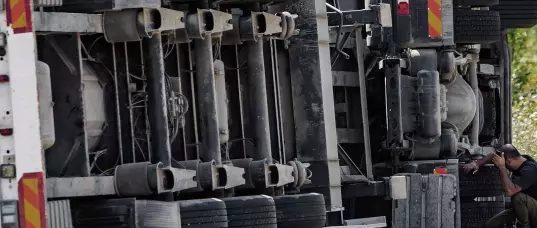

As an injury victim pursuing a truck accident claim, you need an experienced truck accident lawyer in Dallas. Learn about truck crashes and a lawyer’s role.
A truck is a motor vehicle used to transport cargo, carry specialized payloads, or perform other practical work. Trucks vary greatly in size, power, and configuration. Smaller varieties may be mechanically similar to some vehicles. However, some commercial trucks designs make them fit to combine with specialized equipment. Examples are garbage trucks, fire trucks, concrete mixers, and suction excavators.
Other truck types like semi-trucks, 18-wheelers, and tractor-trailers convey goods and food items from one part of the country to the other. The increased number of these commercial vehicles on the roadway increases the possibility of truck accidents. When these large trucks collide with smaller passenger vehicles, it could lead to catastrophic injuries or death.
These two are the basics of most personal injury claims involving truck drivers and trucking companies. Contact a truck accident lawyer at Dunn | Sheehan LLP. Our lawyers have the experience and legal knowledge to help truck accident victims get the maximum compensation.
Get in TouchTrucking accidents are pretty common and can result in serious injury or death. For example, in a 2019 report by the National Highway Traffic Safety Administration (NHTSA), 75% of trucks involved in fatal accidents were large, heavy trucks. The latter refers to trucks with a gross vehicle weight rating (GVWR) greater than 10,000 pounds.
The report also had these key findings:
With these numbers, it is clear that trucks can be a menace on roads with the capacity to cause significant harm. For this reason, it is not far-fetched to expect truckers and truck companies to emphasize safety on the road. The duty to behave carefully also extends to drivers and occupants of passenger vehicles. However, this is easier said than done, which explains why truck accidents keep happening despite safety practices emphasized by governmental regulatory bodies.
Get in TouchWhether it is a commercial motor vehicle accident or a passenger car crash, the fundamental cause of every accident is negligence. When drivers fail to follow the road's rules, the result is an accident. Below are some of the common reasons why Dallas truck accidents occur.
According to the Centers for Disease Control and Prevention, every day about eight people in the United States are killed in crashes that are reported to involve a distracted driver. Distracted driving takes three forms, namely cognitive, manual, and visual. Visual distraction is anything that takes your eyes off the road.
Manual distraction is anything you do with your hands away from the steering wheel. Cognitive distractions have to do with thoughts and actions that require mental effort. Due to the size of trucks and the effort it takes to drive them, commercial truck drivers always need to keep their attention on the road.
You must keep your blood alcohol concentration below 0.04% as a commercial truck driver. This is the law in most states in the U.S., including Texas. When a driver drinks and drives, their cognitive abilities are impaired, and their reflexes are slow. As a result, they cannot react in time to avoid a collision.
The size of trucks makes it hard for them to stop when speeding. For a standard passenger vehicle traveling at 65 miles per hour, it takes about 300 feet to stop. However, for a fully-loaded commercial truck, the stopping distance running at 65 miles per hour is about 525 feet. The latter is 225 feet more than a passenger car. Therefore it is important that truck drivers always maintain the legal and posted speed limit.
Fatigued driving is one of the leading causes of commercial truck accidents. Truckers spend a lot of time on the road conveying goods and food items. While traveling, they might encounter traffic or mechanical failure that delays their trip. As a result, they drive longer than the 15 hours they should be on the road. This causes fatigue, which may cause drowsiness, and ultimately, an accident.
Some of the most common causes of truck crashes are:
The common types of truck accidents are
Truck collisions are known for causing life-threatening or fatal injuries. Rarely do people involved in an accident with a commercial truck sustain minor injuries. Some of the most common injuries from truck accidents are:
After a crash, you should remain at the scene and call 911. Making the call alerts every available first responder about the accident. When the police arrive, tell them your version of how things happened. Stick with the crash's facts and avoid digressing. Also, avoid saying anything about who's at fault and wait for the investigators to conclude their preliminary inquiry.
Where you are severely injured and cannot make the report immediately, find out as soon you can if the other driver filed a report. If they did not, you should report the crash to the police. The police report validates the occurrence of the collision and is credible evidence for your injury claim.
The financial burden of medical care makes people shy away from getting treatment after an accident. However, it would help if you did not let this stop you from getting the help you need. Even if you spend personal funds getting treatment, you can recover the sum in an insurance claim or injury lawsuit.
You need photos of the accident scene, video footage, witness testimony, and an accident reconstruction specialist's report to win a compensation claim. Evidence gathering starts at the crash site, but if your wound prevents you from doing so, a truck accident attorney can help. Contact one as soon as you can.
Insurance companies and their adjusters have a lot of tricks they use in cheating victims of truck accidents on their compensation. Personal injury attorneys know how they operate. Therefore, it would be best to hire one before starting the truck accident claim. An experienced truck accident attorney will offer you experienced legal advice and representation.
Get in TouchIn any accident case, you cannot hope to get compensation without first establishing fault. To show who the responsible party in the crash is, you need to show the four elements of negligence:
For example, if a truck driver were intoxicated, they would have breached their duty of care. If their impairment caused the crash, you have causation. Next is the result of the breach, say the broken bone you suffered and the financial losses (damages) you incurred. Proving the four elements of negligence can be tricky, so hire an experienced truck accident lawyer.
Get in TouchThe nature of a truck collision is such that there can be several responsible parties. But keep in mind that this depends on the case's specific facts. Below are those who may be the at-fault parties in a trucking accident:
Truck accidents are part of the broader category of personal injury law, which allow you to sue for compensatory damages and punitive damages. Compensatory damages are of two kinds: economic and non-economic damages, and they cover:
Punitive damages do not compensate you but serve to punish a grossly negligent fault party. Furthermore, you must file a personal injury lawsuit within two years from the accident date to get compensation.
Get in TouchHaving an experienced legal team on your side when pursuing a compensation claim is crucial. Lawyers do more than render legal advice to you. They sit at the negotiation table with the at-fault driver's insurance carrier. If your case becomes a lawsuit and goes to trial, they have the trial experience to win in court.
In addition, a trucking accident lawyer will help you gather the required evidence and call expert witnesses to prove your claim. You don't have to worry about our legal fees because we work on a contingency fee basis. It means that we don't get paid unless you win your case.
Were you injured in a trucking accident? Then our Dallas truck accident attorneys at Dunn | Sheehan LLP can help you get the compensation you deserve. Our lawyers have decades of experience helping injury victims get justice. Contact us today for a free initial consultation.
Get in Touch





